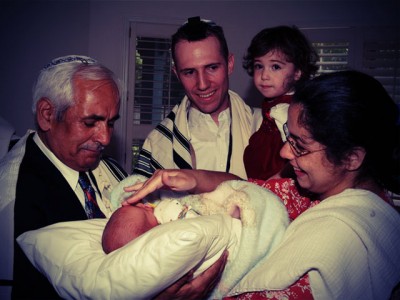
Science has already established that a mother’s actions, attitude and mood during pregnancy have a profound affect on the development of her baby. From the Talmud we learn that this applies to spiritual matters as well.
It is thus vital that during pregnancy the mother increase her observance of Torah and Mitzvot, especially increasing in good deeds such as giving charity, saying Psalms and infusing her environment with a genuine Jewish spirit. This can also include improving upon the Mitzvot she already observes.
It has been traditionally accepted that one should not publicize a pregnancy until the beginning of the fifth month. (This does not apply to very close relatives, and with proper discretion). Likewise, some who have the custom to request a blessing of a Sage or Tzaddik, such as a Rebbe, customarily wait until the end of the first trimester before mentioning the pregnancy.
Special Mitzvot
While nature takes its course in the development of the newborn, we do our part by praying to God for a healthy, easy pregnancy and delivery. There are traditionally three mitzvot that Jewish women emphasize during pregnancy:
Charity: It is customary for the expectant mother to place a few extra coins in a Tzedakah box (charity box) each morning (except on Shabbat and Jewish Holidays). It is also customary to give charity prior to lighting the Shabbat and Holiday candles.
Mezuzah: Having the mezuzah of the home inspected by a certified Scribe to ensure that they are kosher. (The ink on the parchment tends to fade with time, rendering the mezuzah unfit.)
Saving Psalms: In addition to daily prayers, Jewish women (and their husbands) recite additional Psalms each day during the pregnancy, especially chapter 20.
Shir Ha-Maalot – Psalm 121
According to Kabbalah, it is customary to have a copy of Psalm 121 in the delivery room during labor and at the time of birth. These holy passages arouse God’s mercy for an easy birth and delivery.
Another reason given for this custom is that in this way a child’s Jewish education begins at birth. The first images the child is surrounded with are Jewish holy objects. Later, these holy verses are placed within the baby’s crib (in a safe manner), on the doorway to the baby’s bedroom, and on the front door of the home.
Beautiful posters and artwork incorporating Jewish themes are available at Judaic stores or online. One can keep this in mind when decorating the nursery.
During Delivery
It is customary for the husband to recite the following chapters of Psalms during the delivery, as they are especially propitious for this occasion. 1, 2, 3, 4, 20, 21, 22, 23, 24, 33, 47, 72, 86, 90, 91, 92, 93, 104, 112, and 113-150.
A Solid Beginning
The first moments, hours, and days of the baby’s life are likened to that of a newly planted tree, where the initial care sets the tone for its future growth and well-being. Thus, the holy environment that the child enters into establishes a solid spiritual beginning, which serves as a firm foundation throughout his or her life.

